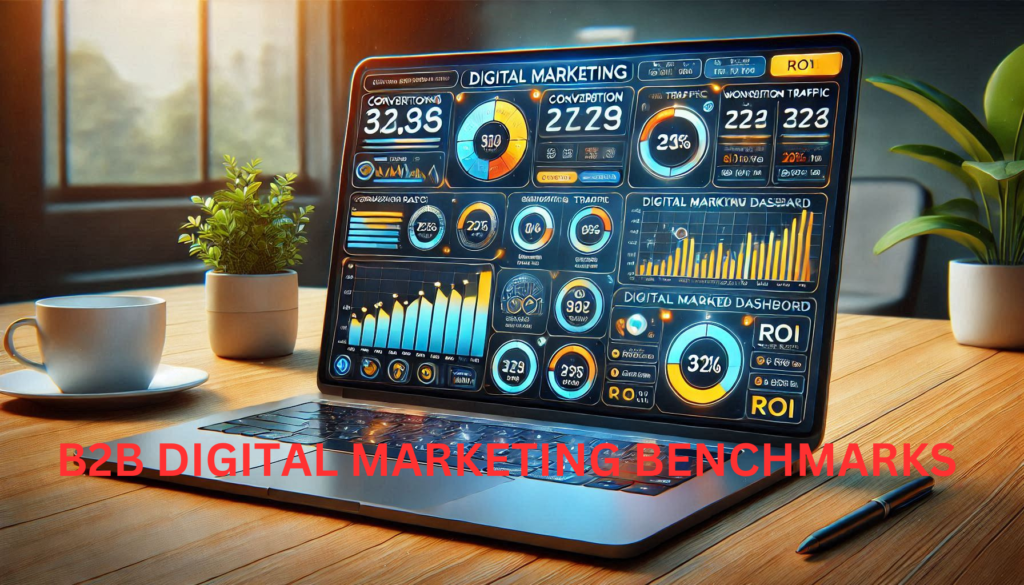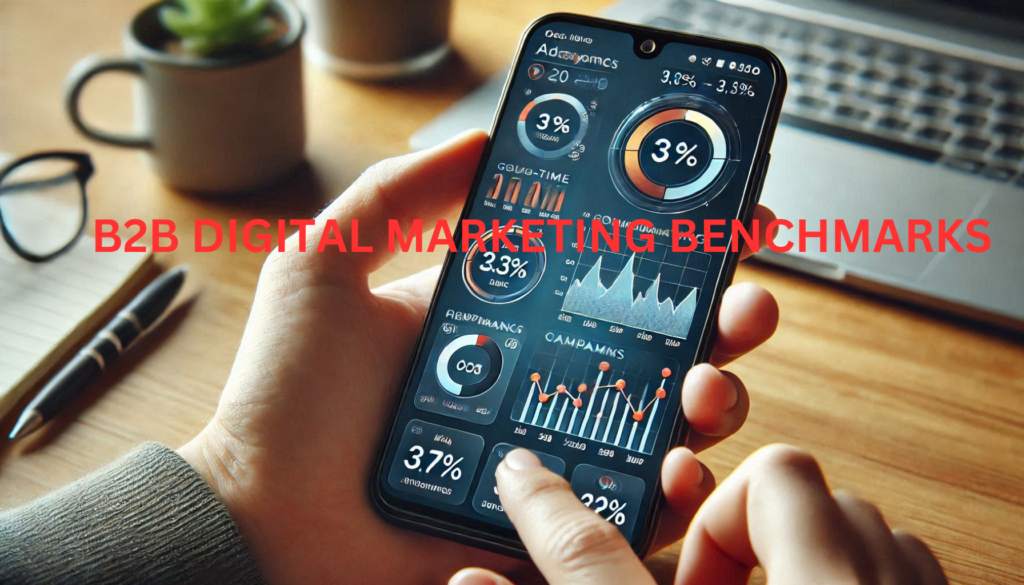In the fast-changing world of B2B digital marketing benchmarks, it’s important to stay ahead. The year 2024 has brought both record-breaking wins and crushing misses, giving businesses useful lessons to improve their online strategies. This article explores what makes B2B digital marketing work or fail, sharing insights, real examples, and key tips for marketers.
The Landscape of B2B Digital Marketing in 2024
Evolution and Trends
The world of B2B digital marketing benchmarks has seen big changes because of new technology and how customers act differently now. Important trends are:
- Increased Adoption of AI and Automation: Companies are using AI to create personalized marketing and automation to make processes smoother.
- Focus on Account-Based Marketing (ABM): Targeting specific customers with customized plans is now a common strategy.
- Rise of Video Content: Video marketing is still very popular, with webinars, live streams, and explainer videos being the top choices.
- Data-Driven Decision Making: Businesses are spending more on analytics to guide their marketing plans.
Challenges Faced
Even with progress, companies still deal with many problems:
- Data Privacy Concerns: New rules on how data can be used mean marketers need to change their plans.
- Content Saturation: It’s getting harder to get noticed online because there’s so much information out there.
- Integration of Technologies: Making different marketing tools and platforms work together smoothly can be tricky.
Record-Breaking Wins
Success Stories
Case Study: TechInnovate Inc.
TechInnovate Inc., a top company that sells software to other businesses, made big changes in 2024 by improving its online marketing plan. Important steps they took were:
- Implementing AI-Powered Chat bots: This made customer interactions better and sped up replies.
- Leveraging Account-Based Marketing: Tailored campaigns for important customers led to a 40% rise in sales.
- Utilizing Video Content: Interesting explainer videos increase website visits by 25%.
Quote from the CMO of TechInnovate Inc.: “Our main strategy of tailoring our approach to individual needs and using the latest technology has been key to reaching our marketing targets.”

Key Tactics for Success
- Personalization: Customizing content and messages for different groups of people makes them more interested and involved.
- Multi-Channel Approach: Using different online platforms helps reach more people and makes a bigger difference.
- Content Quality: Creating useful and well-made content keeps the audience interested and coming back.
- Analytics and Insights: Checking performance data regularly helps make smarter decisions based on facts.
Crushing Misses
Common Pitfalls
Case Study: MarketPro Solutions
Market pro Solutions, a company that helps businesses market to other businesses, faced big problems because they made mistakes in their online marketing plan.
- Over reliance on Email Marketing: Relying only on emails caused a drop in audience interaction.
- Lack of Data Integration: Different platforms had mismatched data, leading to bad choices.
- Neglecting SEO: Not optimizing the website caused a 30% decrease in search engine traffic.
A past marketing manager at Market pro Solutions said: “Not expanding our marketing methods and not combining our data really hurt our overall plan.”
Key Mistakes to Avoid
- Ignoring Multi-Channel Strategies: Depending on just one way to reach people reduces your impact and how many people you can connect with.
- Neglecting SEO: Making your content easy to find on search engines is key to getting noticed and attracting visitors.
- Poor Data Management: If your information is messy or inconsistent, it can lead to poor decisions.
- Lack of Adaptation: If you don’t adjust to what’s happening in the market, you might miss out on great chances.
Key Takeaways
Lessons Learned
- Embrace Technology: Using tools like AI, automation, and data analysis can greatly improve marketing results.
- Prioritize Personalization:Customizing messages and content for different groups of people helps increase interest and interaction.
- Diversify Channels: Sharing your message across different channels helps reach more people and reduces the risk of depending on just one platform.
- Focus on Quality: Producing high-quality content is key to attracting and keeping your audience’s attention.
- Stay Agile: Staying open to changes in the market and new technology trends is important for long-term success.
Benefits of Understanding B2B Digital Marketing Benchmarks
Enhanced Decision-Making
B2B digital marketing benchmarks offer a lot of useful information that can help guide important decisions. By knowing what’s typical in the industry, businesses can:
- Identify Strengths and Weaknesses:Benchmarks show where a company does well or needs to get better compared to others.
- Set Realistic Goals: Knowing average performance numbers helps create goals that are possible to reach.
- Allocate Resources Efficiently: Understanding what works and what doesn’t helps spend money and resources in the best way.
Improved Marketing Strategies
Comparing your marketing efforts to others is important for making them better. The main advantages are:
- Optimized Campaigns: Regularly checking against industry norms helps adjust marketing efforts for better results.
- Enhanced Customer Insights: Benchmarks offer useful information about what customers like and how they act, helping to create focused marketing plans.
- Increased ROI: By using successful strategies and steering clear of mistakes, businesses can get the most out of their investments.
Competitive Advantage
Keeping up with B2B digital marketing benchmarks can give you a big edge over others. The advantages are:
- Market Positioning: Knowing how your company compares to competitors helps you find your place in the market.
- Early Identification of Trends: Checking benchmarks often helps you notice new trends faster, so you can adjust quickly.
- Strategic Planning: Insights from benchmarks help you plan and carry out strategies more effectively.
Performance Measurement
Accurate performance measurement is another key advantage. Benchmarks help in:
- Track Progress: By using benchmarks regularly, businesses can see how they are doing over time and understand the results of their marketing actions.
- Evaluate Success: Benchmarks offer a clear way to judge how well marketing campaigns are performing.
- Identify Improvement Areas: When businesses compare their results to benchmarks, they can spot where they need to get better.
Enhanced Customer Relationships
Understanding B2B digital marketing benchmarks can greatly improve how you connect with customers:
- Personalized Marketing: Benchmarks help you learn what customers like, so you can tailor your marketing to their interests.
- Better Engagement: When your marketing follows industry standards, you can keep customers more interested and happy.
- Increased Loyalty: Using benchmarks helps you understand and meet customer needs better, which makes them more loyal to your business.
Efficient Resource Management
B2B digital marketing benchmarks helps manage resources better:
- Optimized Budgets: Knowing which strategies work best helps in spending marketing money wisely.
- Resource Allocation: Companies can use their resources more effectively by looking at benchmark data.
- Reduced Waste: By concentrating on strategies that work well, businesses can avoid wasting time and resources on methods that don’t work.

Innovation and Adaptation
Following B2B digital marketing benchmarks guidelines aids in a company’s expansion and adaptability:
- Encourages Innovation: Knowing what’s common in the industry pushes businesses to come up with new ideas and stay ahead of rivals.
- Promotes Adaptability: Regularly checking industry standards helps businesses adjust to changes in the market and new technology.
- Drives Continuous Improvement: Benchmarking helps create a mindset of always getting better within the company.
Key Takeaways
- Enhanced Decision-Making: Use benchmarks to spot strengths and weaknesses, set achievable goals, and use resources wisely..
- Improved Marketing Strategies: Improve campaigns, understand customers better, and boost returns with benchmarking.
- Competitive Advantage: Get a better position in the market, spot trends early, and plan smartly.
- Performance Measurement: Measure progress, check success, and find areas to improve with accurate tracking.
- Enhanced Customer Relationships: Tailor marketing, boost engagement, and build customer loyalty.
- Efficient Resource Management: Manage budgets better, use resources efficiently, and cut waste.
- Innovation and Adaptation: Foster new ideas, stay flexible, and keep improving continuously.
Impact of Understanding B2B Digital Marketing Benchmarks
Strategic Decision-Making
B2B digital marketing benchmarks have a profound impact on strategic decision-making. By providing a clear picture of industry standards, benchmarks enable businesses to make informed choices that align with market trends and customer expectations.
- Informed Goals: Setting realistic and achievable goals becomes easier when businesses understand where they stand compared to their competitors.
- Effective Resource Allocation: Knowing what strategies are effective helps in directing resources towards high-impact activities, improving overall efficiency.
- Data-Driven Strategies: Benchmarks provide the data necessary to develop strategies that are grounded in reality and tailored to specific business needs.
Performance Optimization
Understanding B2B digital marketing benchmarks allows for significant performance optimization:
- Campaign Effectiveness: Businesses can fine-tune their marketing campaigns based on benchmark data, ensuring maximum impact and efficiency.
- Customer Engagement: Enhanced insights into customer behavior and preferences lead to more effective engagement strategies.
- Improved ROI: By focusing on what works and avoiding common pitfalls, businesses can see a better return on their marketing investments.
Competitive Positioning
The impact on competitive positioning is another critical benefit of benchmarking:
- Market Leadership: Companies that continuously benchmark their performance are better positioned to become market leaders.
- Trend Identification: Early identification of emerging trends through benchmarking allows businesses to adapt quickly and stay ahead of the competition.
- Strategic Advantage: Regular benchmarking provides a strategic advantage by highlighting areas of improvement and growth opportunities.
Quality of Customer Relationships
B2B digital marketing benchmarks profoundly affect the quality of customer relationships:
- Personalized Experiences: Insights from B2B digital marketing benchmarks enable businesses to deliver more personalized marketing experiences, increasing customer satisfaction.
- Enhanced Loyalty: By consistently meeting or exceeding industry standards, businesses can build stronger, more loyal customer bases.
- Improved Retention: Better understanding of customer needs and preferences leads to improved retention rates.
Operational Efficiency
The impact on operational efficiency is significant:
- Streamlined Processes: B2B digital marketing benchmarks highlight best practices, enabling businesses to streamline their operations for better efficiency.
- Cost Reduction: Focusing on high-impact activities and eliminating ineffective strategies helps in reducing overall marketing costs.
- Resource Optimization: Effective resource management based on benchmark data ensures that time and money are spent where they are most effective.
Innovation and Adaptability
Understanding B2B digital marketing benchmarks fosters innovation and adaptability:
- Encouraged Innovation: B2B digital marketing benchmarks inspire businesses to innovate and develop new strategies to stay competitive.
- Promoted Agility: Regular benchmarking ensures that businesses remain agile and responsive to changes in the market and technology.
- Continuous Improvement: A culture of continuous improvement is nurtured, driving businesses to constantly refine and enhance their marketing efforts.
Key Takeaways
- Strategic Decision-Making: Informed goals, effective resource allocation, and data-driven strategies.
- Performance Optimization: Improved campaign effectiveness, customer engagement, and ROI.
- Competitive Positioning: Market leadership, trend identification, and strategic advantage.
- Quality of Customer Relationships: Personalized experiences, enhanced loyalty, and improved retention.
- Operational Efficiency: Streamlined processes, cost reduction, and resource optimization.
- Innovation and Adaptability: Encouraged innovation, promoted agility, and continuous improvement.

Future Impact of Understanding B2B Digital Marketing Benchmarks
Predictive Analytics and Data-Driven Insights
B2B digital marketing benchmarks will be very important in the future. They will improve the ability to predict analytics and offer better insights based on data. As technology gets better, companies will depend more on these standards to predict trends and make smart, forward-thinking choices.
- Advanced Forecasting: Companies will use past data to guess future market trends and customer actions, helping them plan better.
- Real-Time Data Utilization: By using live data, businesses can change their plans fast when the market shifts.
- Enhanced Personalization: With better analysis, companies can create marketing that fits each customer perfectly, making them happier and more loyal.
Increased Automation and AI Integration
In the future, automation and artificial intelligence (AI) will play a bigger role in using B2B digital marketing benchmarks. These technologies will make processes smoother and improve efficiency.
- Automated Benchmarking: Automation will allow businesses to constantly track and analyze benchmarks, helping them keep up with industry standards.
- AI-Driven Insights: AI will offer more detailed insights from benchmark data, revealing patterns and trends that might be hard for humans to spot.
- Efficient Resource Management: Automation and AI will help businesses use their resources better, cutting waste and increasing returns on investment.
Enhanced Competitive Edge
Knowing the standards for B2B digital marketing benchmarks will be crucial for staying ahead in the future. Businesses that use this data well will have a better chance of beating their competitors.
- Agile Adaptation: Companies can swiftly respond to changes in the market and trends, keeping them ahead of others.
- Innovative Strategies: This data will help businesses come up with fresh and unique marketing ideas that set them apart.
- Sustained Growth: By regularly checking and improving their performance based on these standards, businesses will keep growing and thriving.
Evolution of Customer Engagement
The future will greatly change how businesses connect with customers, as benchmarks help companies better understand and predict what customers need.
- Proactive Engagement: Using insights from benchmarks, businesses can reach out to customers before they even ask, solving their needs early.
- Omnichannel Strategies: Companies will create smoother marketing plans that work well across all platforms, making the customer experience consistent everywhere.
- Increased Loyalty: By always going beyond what customers expect, using data to guide decisions, businesses will build stronger customer loyalty.
Strategic Innovation and Adaptation
B2B digital marketing benchmarks will help businesses stay ahead by driving smart innovation and adjustments, keeping them relevant and competitive in a fast-changing market.
- Continuous Improvement: Regular benchmarking will encourage businesses to keep improving, pushing them to innovate and fine-tune their strategies.
- Adaptability to Change: Companies will be better prepared to handle new technologies and market changes, staying strong and flexible.
- Long-Term Success: By using benchmark data to guide their strategies, businesses will achieve lasting success and stability.
Sustainable Business Practices
In the future, B2B digital marketing benchmarks will help businesses become more sustainable in these ways:
- Efficient Resource Use: Benchmarking will help companies use resources more efficiently, cutting down on waste and supporting sustainability.
- Responsible Marketing: Businesses will use more honest and responsible marketing, based on what customers really care about.
- Ethical Standards: By understanding benchmarks, companies will be encouraged to follow strong ethical practices, building trust and credibility.
Key Takeaways
- Predictive Analytics and Data-Driven Insights: Better predictions, using live data, and more personalized experiences.
- Increased Automation and AI Integration: Automated comparisons, AI-powered insights, and smarter resource use.
- Enhanced Competitive Edge: Quick adjustments, creative plans, and steady growth.
- Evolution of Customer Engagement: Active interaction, multi-channel approaches, and stronger loyalty.
- Strategic Innovation and Adaptation: Constant improvement, flexibility, and lasting success.
- Sustainable Business Practices: Smart resource use, ethical marketing, and high standards.
Conclusion
Knowing and using B2B digital marketing benchmarks is very important for businesses that want to stay ahead and do well in a constantly changing market. By using these standards, companies can make better choices, improve their results, and keep a strong position against their competitors. The future of digital marketing will depend on better data analysis, automation, and AI, all of which will be supported by ongoing measurement and comparison.
FAQs
1. What are B2B digital marketing benchmarks?
B2B digital marketing benchmarks are standards or benchmarks by which the effectiveness of digital marketing tactics can be evaluated; they offer information on industry-average performance measures, assisting companies in assessing their performance and pinpointing areas in need of development.
2. Why are B2B digital marketing benchmarks important?
Benchmarks are important because they provide a clear picture of industry standards, allowing businesses to set realistic goals, optimize their marketing strategies, and stay competitive. They help in identifying strengths and weaknesses, improving customer engagement, and maximizing ROI.
3. How can businesses use benchmarks to improve their marketing strategies?
Businesses can use benchmarks to fine-tune their marketing campaigns, allocate resources more effectively, and focus on strategies that deliver the best results. By comparing their performance against industry standards, companies can identify gaps and areas for improvement, leading to better overall performance.
4. What is the future impact of understanding B2B digital marketing benchmarks?
In the future, understanding B2B digital marketing benchmarks will enhance predictive analytics, enable greater integration of automation and AI, and provide a significant competitive edge. Businesses will benefit from real-time data utilization, advanced forecasting, and more personalized customer engagement strategies.
5. How do benchmarks contribute to operational efficiency?
Benchmarks highlight best practices and effective strategies, allowing businesses to streamline their operations, reduce costs, and allocate resources efficiently. This leads to improved productivity and better utilization of marketing budgets.
6. Can benchmarks help in identifying emerging trends?
Yes, regular benchmarking helps in identifying emerging trends early, enabling businesses to adapt quickly and stay ahead of the competition. This proactive approach allows companies to capitalize on new opportunities and mitigate potential risks.
7. How do benchmarks enhance customer relationships?
Benchmarks provide valuable insights into customer preferences and behavior, allowing businesses to create more personalized and engaging marketing experiences. This leads to increased customer satisfaction, loyalty, and retention.
